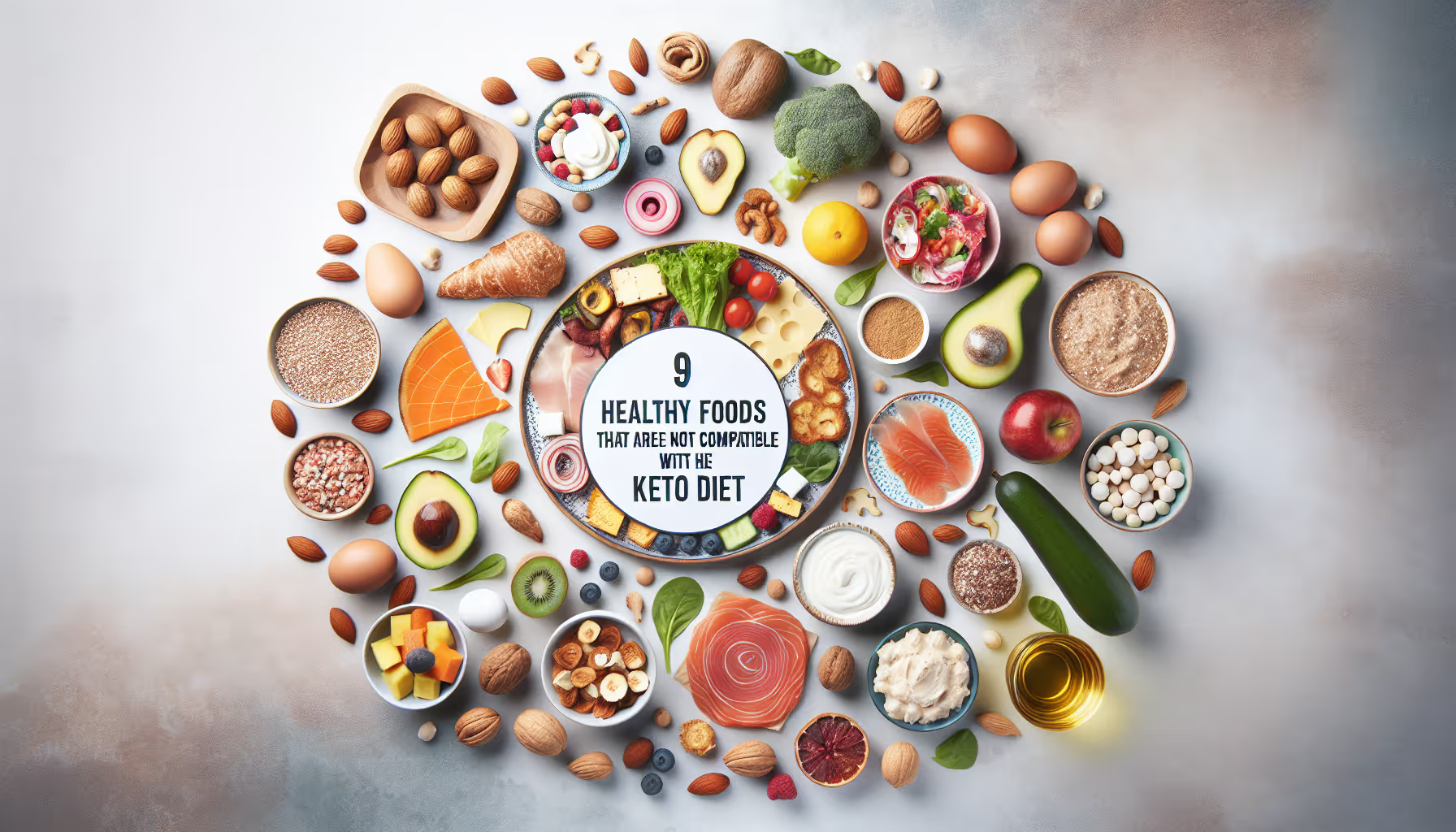Following a ketogenic diet involves minimizing carbohydrate intake while increasing fats to enter a state of ketosis. However, not all healthy foods align with these macronutrient requirements. In this article, we'll discuss nine healthy foods that you should avoid on the keto diet, despite their nutritional benefits.
Why Some Healthy Foods Aren't Keto-Friendly
Healthy foods are typically rich in vitamins, minerals, and other essential nutrients. However, many of these foods are also high in carbohydrates, which can disrupt ketosis.
The ketogenic diet requires a strict limit on carb intake, usually between 20-50 grams per day, to maintain the state of ketosis where your body burns fat for fuel instead of carbs. According to a study by the American Journal of Clinical Nutrition, "The typical macronutrient breakdown for a keto diet is 70% fats, 25% protein, and 5% carbohydrates" (Schwalfenberg, 2012). This tight regulation is crucial for achieving and maintaining ketosis.
Keep in mind that while these foods are nutritious, their carbohydrate content makes them unsuitable for a keto diet. Therefore, understanding which healthy foods to avoid can help you maintain ketosis and achieve your dietary goals more effectively.
High-Carb Fruits
Fruits are generally considered a cornerstone of a healthy diet due to their high vitamin and antioxidant content. However, many fruits are high in natural sugars, which translates to high carbohydrate content.
Fruits like bananas, apples, and grapes, for example, can have between 15-30 grams of carbs per serving.
One advantage of avoiding high-carb fruits is that it allows you to stay within your daily carb limit more easily. Instead, opt for lower-carb fruits like berries, which offer nutritional benefits without the high carb count. For more insights on which fruits to avoid, check out our detailed guide on which low-carb fruits are best for your keto diet.
Starchy Vegetables
Starchy vegetables such as potatoes, sweet potatoes, and corn are packed with nutrients but also come with a high carbohydrate load. These vegetables can quickly add up in carbs, making it challenging to stay in ketosis.
Even a small serving of these starchy veggies can take up a significant portion of your daily carb allowance.
Note that while these vegetables are healthy and offer numerous benefits, their high starch content makes them unsuitable for a keto diet. Instead, opt for non-starchy vegetables like leafy greens, broccoli, and cauliflower, which are low in carbs and high in fiber and essential nutrients. For more options, refer to our list of low-carb vegetables perfect for keto.
Legumes and Beans
Legumes and beans, including lentils, chickpeas, and black beans, are excellent sources of protein and fiber. However, they are also high in carbohydrates. Even a half-cup serving of these foods can contain 20 grams or more of carbs, which can disrupt your keto diet.
Side note: While legumes and beans are beneficial for heart health and digestion, their carbohydrate content makes them a poor choice for keto. If you're looking for plant-based protein sources, consider tofu or tempeh, which are lower in carbs and can fit more easily into your ketogenic meal plan. For more guidance, see our article on are beans keto-friendly?.
Low-Fat Dairy
Low-fat dairy products like skim milk, low-fat yogurt, and reduced-fat cheese are often recommended in general healthy diets. However, these products usually have higher carbohydrate content compared to their full-fat counterparts.
The removal of fat often means the addition of sugars or other carbohydrates to maintain flavor and texture.
A benefit here is that full-fat dairy products like heavy cream, full-fat cheese, and Greek yogurt are more keto-friendly options. They provide the necessary fats while keeping carbs low, helping you stay in ketosis more effectively. For more information on dairy, check out our post on best and worst cheeses for keto diets.
Some Nuts and Seeds
Nuts and seeds are generally considered healthy snacks, rich in healthy fats, fiber, and protein. However, not all nuts and seeds are low in carbs. Cashews, for example, have around 9 grams of carbs per ounce, which can add up quickly if you're not careful.
One advantage of being selective with nuts and seeds is that it allows you to enjoy their benefits without exceeding your carb limit. Opt for lower-carb options like macadamia nuts, pecans, and chia seeds, which can be enjoyed in moderation on a keto diet. For more detailed advice on which nuts and seeds to avoid, check out our article on what not to eat on keto.
Certain Condiments and Sauces
Condiments and sauces can be sneaky sources of added sugars and carbs. Items like ketchup, barbecue sauce, and some salad dressings often contain high amounts of sugar, which can quickly add up and knock you out of ketosis.
Even a small serving can introduce several grams of hidden carbs into your meal.
Keep in mind that while these condiments can enhance the flavor of your dishes, their carbohydrate content can be detrimental to your keto goals. Instead, opt for keto-friendly alternatives like mustard, hot sauce, or homemade dressings using olive oil and vinegar. These options provide flavor without the added carbs.
For more information on maintaining a keto-friendly diet, you might find our guide on how to follow a vegetarian ketogenic diet in a healthy way useful.
References
Schwalfenberg, G. K. (2012). The Alkaline Diet: Is There Evidence That an Alkaline pH Diet Benefits Health? Journal of Environmental and Public Health. Retrieved from https://www.ncbi.nlm.nih.gov/pmc/articles/PMC3195546/
Healthline. (2023). 16 Foods to Avoid (or Limit) on the Keto Diet. Retrieved from https://www.healthline.com/nutrition/what-not-to-eat-on-keto






